He is one of Thailand’s most accomplished musicians whose goal is to spread his enthusiasm to the widest possible audience through his music business, collaborations with international schools, solo performances and the band he shares with his two beautiful sisters. Maxmilian Wechsler chats to the multi-talented Dr Paye
| DR Thaweewet Paye Srinarong is just 35-years-old and yet is already renowned as a multi-talented artist. He is arguably his country’s most famous living violinist, conductor, accomplished composer, music producer and also an entrepreneur. He was the first recipient of the Royal Highness Princess Galyani Vadhana’s Classical Music Scholarship, the first Thai violinist with a doctoral degree in music and the first to perform at Carnegie Hall. And he is part of a highly successful trio accompanied by his two talented and extremely glamorous sisters. |
Dr Paye, as he prefers to be called, has spent half his life studying and performing in the UK and the US. His credentials are certainly impressive: He earned a Bachelor’s Degree in Music with First Class Honors from the Royal Academy of Music (London), Master’s of Music from Yale University, and recently, Doctor of Musical Arts from Stony Brook University, New York.
With this background, the classically trained Dr Paye is not surprisingly passionate about pursuing a broad spectrum of musical avenues and genres. This is reflected in performances at concerts, festivals and musical events all over the world.
Among the venues and events he’s graced are Carnegie Hall, the Aspen Music Festival, the Music Academy of the West, Spoletto, USA, the White House, and the Royal Festival Hall in London. Last October he made his South American solo debut in Brazil with a Brazilian orchestra, an experience he says he’d always dreamed of.
Meanwhile, his band VieTrio has released four chart-topping iTunes albums. The band has captivated audiences in Singapore, Malaysia, Taiwan, China, Qatar, Myanmar, Kuwait, Hong Kong, Tokyo, and recently played at the prestigious Kennedy Center in Washington, DC.
In 2013 he launched a chamber music project called JEEB Bangkok, which merges pop cultures with chamber music. The project has gained massive public appreciation and created a new vibe for classical music enthusiasts in Thailand. A family-run music school, Viemus, has been presenting concerts and camps in Thailand, Japan, Vienna and Prague. The school also manufactures its own line of string instruments.
Dr Paye is also Music Director of Thai Youth Orchestra and was elected president of the Old England Student Association under the Royal Patronage established 78 years ago – the youngest person to ever hold the position (see article in the May issue of The BigChilli).
He has been featured in countless TV specials, newspaper articles and magazines. And Dr Paye is a fanatic supporter of Arsenal FC and took great pleasure in Arsenal’s victory in the FA Cup last May.
Very versatile
“Like most people, I enjoy variety in my life,” said Dr Paye at a new Thonglor branch of the family-run Viemus International Music School. “I pursue many interests which are mainly involved with the music business. I have two music schools that I run with my younger sister Kanyapas, who is an accomplished cellist, singer and actor, and older sister Ariya, who is a violinist and a former diplomat at the Ministry of Foreign Affairs.”
Kanyapas recently starred in a hugely successful production of ‘Cixi Taihou The Musical’ as the controversial and powerful Chinese Empress Cixi. The musical is a stage adaption of MR Kukrit Pramoj’s composition. Her Royal Highness Princess Soamsawali plays Cixi Taihou’s mother. The songs, also released on the CD, are brilliant, especially the first by the Princess and the eleventh performed by Kanyapas.
“My mother, Assistant Professor Phonthan, is helping in the school and looking after the family. We have a branch in Thonglor and another in Ratchadapisek. We started about six years ago when I was still living in New York. I was going back and forth between the US and Thailand. I moved back to Bangkok about three years ago,” Dr Paye said.
“We have students as young as one and a half, all the way up to 55 years old. Anyone who loves music can come and study. The objective of the school is to create happiness through music and to offer a very high standard of teaching.
“My father, Professor Phukorn Srinarong, was one of the founding members of the Bangkok Symphony Orchestra. He is one of the most prominent musicians of his generation, the ones who really kick-started classical music in Thailand, before there were any orchestras.
“I also perform, write and produce songs. VieTrio, the band I have with my sisters, is basically classical/electronic rock cross-over. The violins have the main voice, but we also sing. It is a totally new approach. We have dancers and proper performances. We signed a recording contract with GMM Grammy and have released four albums. We still do live concerts. In May we performed in Malaysia. We travel quite a bit.
“As violin soloist I also perform a lot. In this role I do concertos and real classical stuff, because this is how I grew up. I started learning violin very early and left home when I was 15 to study music in London. I spent eight years there and ten in the United States working and studying until I finished my doctorate. Then I decided that maybe I wanted to do something of my own. I realized that I wanted to expand my music to reach new audiences.
“I feel this is very important, because classical music is underappreciated in Thailand, although that is starting to change. It used to be very unpopular here, but over the last ten years there has been a lot of effort put into classical music in Thailand, coming from many different sources. When I was living in Thailand about 20 years ago, things were very different. Concertgoers were a few expats and some Thai elites.
“Things are very different now. Students are reaching out to learn music. Music has become a widely accepted career choice and more Thai universities are offering proper music degrees. Things are on the way up. You don’t have to live in New York or Europe to pursue classical music anymore.
“I compose many different kinds of music – classical, movie soundtracks, rock, and pop and electronic. It is hard to explain, but what I strive for is classical crossover. Imagine rock music played on the violin. It is entertaining, has a lot of energy and it keeps people on their toes. My master plan is to get people interested in violin and as a result have the urge to explore classical music. I want to inspire the younger generation with my music.”
With this background, the classically trained Dr Paye is not surprisingly passionate about pursuing a broad spectrum of musical avenues and genres. This is reflected in performances at concerts, festivals and musical events all over the world.
Among the venues and events he’s graced are Carnegie Hall, the Aspen Music Festival, the Music Academy of the West, Spoletto, USA, the White House, and the Royal Festival Hall in London. Last October he made his South American solo debut in Brazil with a Brazilian orchestra, an experience he says he’d always dreamed of.
Meanwhile, his band VieTrio has released four chart-topping iTunes albums. The band has captivated audiences in Singapore, Malaysia, Taiwan, China, Qatar, Myanmar, Kuwait, Hong Kong, Tokyo, and recently played at the prestigious Kennedy Center in Washington, DC.
In 2013 he launched a chamber music project called JEEB Bangkok, which merges pop cultures with chamber music. The project has gained massive public appreciation and created a new vibe for classical music enthusiasts in Thailand. A family-run music school, Viemus, has been presenting concerts and camps in Thailand, Japan, Vienna and Prague. The school also manufactures its own line of string instruments.
Dr Paye is also Music Director of Thai Youth Orchestra and was elected president of the Old England Student Association under the Royal Patronage established 78 years ago – the youngest person to ever hold the position (see article in the May issue of The BigChilli).
He has been featured in countless TV specials, newspaper articles and magazines. And Dr Paye is a fanatic supporter of Arsenal FC and took great pleasure in Arsenal’s victory in the FA Cup last May.
Very versatile
“Like most people, I enjoy variety in my life,” said Dr Paye at a new Thonglor branch of the family-run Viemus International Music School. “I pursue many interests which are mainly involved with the music business. I have two music schools that I run with my younger sister Kanyapas, who is an accomplished cellist, singer and actor, and older sister Ariya, who is a violinist and a former diplomat at the Ministry of Foreign Affairs.”
Kanyapas recently starred in a hugely successful production of ‘Cixi Taihou The Musical’ as the controversial and powerful Chinese Empress Cixi. The musical is a stage adaption of MR Kukrit Pramoj’s composition. Her Royal Highness Princess Soamsawali plays Cixi Taihou’s mother. The songs, also released on the CD, are brilliant, especially the first by the Princess and the eleventh performed by Kanyapas.
“My mother, Assistant Professor Phonthan, is helping in the school and looking after the family. We have a branch in Thonglor and another in Ratchadapisek. We started about six years ago when I was still living in New York. I was going back and forth between the US and Thailand. I moved back to Bangkok about three years ago,” Dr Paye said.
“We have students as young as one and a half, all the way up to 55 years old. Anyone who loves music can come and study. The objective of the school is to create happiness through music and to offer a very high standard of teaching.
“My father, Professor Phukorn Srinarong, was one of the founding members of the Bangkok Symphony Orchestra. He is one of the most prominent musicians of his generation, the ones who really kick-started classical music in Thailand, before there were any orchestras.
“I also perform, write and produce songs. VieTrio, the band I have with my sisters, is basically classical/electronic rock cross-over. The violins have the main voice, but we also sing. It is a totally new approach. We have dancers and proper performances. We signed a recording contract with GMM Grammy and have released four albums. We still do live concerts. In May we performed in Malaysia. We travel quite a bit.
“As violin soloist I also perform a lot. In this role I do concertos and real classical stuff, because this is how I grew up. I started learning violin very early and left home when I was 15 to study music in London. I spent eight years there and ten in the United States working and studying until I finished my doctorate. Then I decided that maybe I wanted to do something of my own. I realized that I wanted to expand my music to reach new audiences.
“I feel this is very important, because classical music is underappreciated in Thailand, although that is starting to change. It used to be very unpopular here, but over the last ten years there has been a lot of effort put into classical music in Thailand, coming from many different sources. When I was living in Thailand about 20 years ago, things were very different. Concertgoers were a few expats and some Thai elites.
“Things are very different now. Students are reaching out to learn music. Music has become a widely accepted career choice and more Thai universities are offering proper music degrees. Things are on the way up. You don’t have to live in New York or Europe to pursue classical music anymore.
“I compose many different kinds of music – classical, movie soundtracks, rock, and pop and electronic. It is hard to explain, but what I strive for is classical crossover. Imagine rock music played on the violin. It is entertaining, has a lot of energy and it keeps people on their toes. My master plan is to get people interested in violin and as a result have the urge to explore classical music. I want to inspire the younger generation with my music.”
Playing for VIPs
“I performed many times for the late Her Royal Highness Princess Galyani Vadhana. She loved classical music and often attended my concerts. My family visited her residence a few times to report on the progress of my music studies. I was the first to be awarded the Princess Galyani Vadhana Classical Music Scholarship and later my sister Kanyapas was also the recipient. Some of us who have seen her in the role of Cixi Taihou will agree that, besides playing and teaching cello very well, she has grown into an excellent singer and actor.
“I have played a few times for Their Majesties the King and Queen. Her Majesty likes the classics such as Frank Sinatra, and the King likes Dixieland jazz.
“When I was 15 years old I performed chamber music at the White House for President Clinton in 1995. I can’t remember where it was in the White House but it was very nice there. At that time I was doing a tour with musicians from other Asian countries. I was one of only three Thais, and the only violinist, who won an audition to participate the tour.”
Musical ventures
“About 15 percent of our students at Viemus are foreigners and the rest are a good mix of Thais who study in international and Thai schools. We get students who want to study music as a hobby, but also some who aspire to be professional musicians. Students are inspired by what VieTrio does as a band and they want to have fun with the music. We have very lovely community events and often organize music camps outside Bangkok or even outside Thailand. We did two camps in Tokyo, one in Vienna, Austria, and another in Prague, Czech Republic.
“Students can learn to play many instruments at our school. We have about 20 teachers, both foreigners and Thais, who speak altogether seven languages. We try our best to recruit the finest, most inspiring teachers. This is a big part of the reason why we have not expanded quickly. A music school is not something that you can franchise like convenience stores. You have to train your teachers to make sure that they go by a proper curriculum. That’s something I learned from my father.
“The school offers lessons in all instruments. We also offer special training courses for those who need help preparing for examinations or university. The most popular instruments are violin, cello and piano. We have also ballet classes and Latin dance. A lot of people come to us thanks to VieTrio. Many kids want to learn violin because they see my sisters playing and want to be like them,” Dr Paye said.
He then talked about a project that is clearly dear to his heart: “JEEB is a Thai expression for flirt. It is like you go to a girl, talk and ask for her phone number and compliment her on her beauty and intelligence. JEEB is basically a classical music/boy band, comprised of me and six other guys from Thailand who are accomplished classical musicians with international careers. Each year we stage a small music festival. This is a lot of work as you can imagine, but it is worth it because we get such a heartfelt response from the people who attend.
“JEEB present concerts the way it has never been done before in this region. Some very kind corporate companies support us and we hope they will continue to do so. The festival is a non-profit, community service venture. We go to schools to introduce our music to students. We have played at schools for the blinds and orphans. We perform at public places like Siam Paragon and film the reactions of the people.
“My father founded the Thai Youth Orchestra about 30 years ago. This year I am making a transition to Music Director and Conductor. We hope to make the organization more active and international in the future. We have 60-70 young musicians in the orchestra, all pro bono. I believe that youth should seek experience, not for the money, especially this little. Over the years the orchestra has produced hundreds of leaders in music and other careers, including principle players at the Bangkok Symphony Orchestra and the Thailand Philharmonic Orchestra.
“I am concerned because nowadays money has become the main objective over learning. Once you start giving the young and inexperienced payrolls the objectives change and it ceases to be educational, and in the long run this will hurt the students, as they will settle for less and not what they could potentially achieve. The Thai Youth Orchestra is desperately looking for sponsorship. We are hoping that someone will come and help us out.”
“I performed many times for the late Her Royal Highness Princess Galyani Vadhana. She loved classical music and often attended my concerts. My family visited her residence a few times to report on the progress of my music studies. I was the first to be awarded the Princess Galyani Vadhana Classical Music Scholarship and later my sister Kanyapas was also the recipient. Some of us who have seen her in the role of Cixi Taihou will agree that, besides playing and teaching cello very well, she has grown into an excellent singer and actor.
“I have played a few times for Their Majesties the King and Queen. Her Majesty likes the classics such as Frank Sinatra, and the King likes Dixieland jazz.
“When I was 15 years old I performed chamber music at the White House for President Clinton in 1995. I can’t remember where it was in the White House but it was very nice there. At that time I was doing a tour with musicians from other Asian countries. I was one of only three Thais, and the only violinist, who won an audition to participate the tour.”
Musical ventures
“About 15 percent of our students at Viemus are foreigners and the rest are a good mix of Thais who study in international and Thai schools. We get students who want to study music as a hobby, but also some who aspire to be professional musicians. Students are inspired by what VieTrio does as a band and they want to have fun with the music. We have very lovely community events and often organize music camps outside Bangkok or even outside Thailand. We did two camps in Tokyo, one in Vienna, Austria, and another in Prague, Czech Republic.
“Students can learn to play many instruments at our school. We have about 20 teachers, both foreigners and Thais, who speak altogether seven languages. We try our best to recruit the finest, most inspiring teachers. This is a big part of the reason why we have not expanded quickly. A music school is not something that you can franchise like convenience stores. You have to train your teachers to make sure that they go by a proper curriculum. That’s something I learned from my father.
“The school offers lessons in all instruments. We also offer special training courses for those who need help preparing for examinations or university. The most popular instruments are violin, cello and piano. We have also ballet classes and Latin dance. A lot of people come to us thanks to VieTrio. Many kids want to learn violin because they see my sisters playing and want to be like them,” Dr Paye said.
He then talked about a project that is clearly dear to his heart: “JEEB is a Thai expression for flirt. It is like you go to a girl, talk and ask for her phone number and compliment her on her beauty and intelligence. JEEB is basically a classical music/boy band, comprised of me and six other guys from Thailand who are accomplished classical musicians with international careers. Each year we stage a small music festival. This is a lot of work as you can imagine, but it is worth it because we get such a heartfelt response from the people who attend.
“JEEB present concerts the way it has never been done before in this region. Some very kind corporate companies support us and we hope they will continue to do so. The festival is a non-profit, community service venture. We go to schools to introduce our music to students. We have played at schools for the blinds and orphans. We perform at public places like Siam Paragon and film the reactions of the people.
“My father founded the Thai Youth Orchestra about 30 years ago. This year I am making a transition to Music Director and Conductor. We hope to make the organization more active and international in the future. We have 60-70 young musicians in the orchestra, all pro bono. I believe that youth should seek experience, not for the money, especially this little. Over the years the orchestra has produced hundreds of leaders in music and other careers, including principle players at the Bangkok Symphony Orchestra and the Thailand Philharmonic Orchestra.
“I am concerned because nowadays money has become the main objective over learning. Once you start giving the young and inexperienced payrolls the objectives change and it ceases to be educational, and in the long run this will hurt the students, as they will settle for less and not what they could potentially achieve. The Thai Youth Orchestra is desperately looking for sponsorship. We are hoping that someone will come and help us out.”
| Making instruments “Viemus School has our own line of string instruments that we manufacture ourselves. We work with makers from Asia based in Hong Kong. We import the woods from Europe; the quality varies according to what the student can afford. Asian craftsmanship is very good nowadays, and compared to modern European instruments, we can create the same quality instruments, if not even better, for less,” Dr Paye said. |
“Not all students can afford expensive instruments. Some can pay 300,000 baht for imported Italian violins. But some students cannot or are unwilling to pay that kind of money, so we provide them instruments that are high quality at an affordable price. That’s our goal – to make music accessible for everyone.
“We continue to import strings, cases, and music stands from Europe. Good quality accessories are very important because a bad one will be thrown away in two months, but a very good European one will last a long while.”
Musical influences and directions
“There are many composers I like. My favourite is Mozart. I was born on the same day of the year, January 27,260 years after he was. I have always been attached to his compositions. But music is like food. You can’t eat the same things all your life. You have to explore. I like French music and composers like Revel and Debussy. I love Beethoven and Tchaikovsky. Lately I have been really into Mendelssohn. Don’t get me wrong, I also love R&B, Soul, and dance music!”
“Classical music started in Europe and it moved to America, the ‘New World,’ about 100 years ago. Now Asia is sort of the ‘New World’ in terms of classical music. Great things are happening here, especially in Japan, China and South Korea, with Thailand catching up fast. I want to be a part of this development. Good music improves culture and behaviour – it can actually make you a better human being. I don’t mean only classical music, but other types as well, like the Beatles and really good jazz. There are some good jazz clubs here that I enjoy going to in my spare time.
“If you watch Thai dramas on television you will notice that there is more classical music than ever before. Female leading characters especially play instruments in the dramas, usually violin or piano. It’s becoming a part of the culture and it will keep growing more and more. Thailand is developing all the time, closing in on Japan, China and South Korea which already have very high quality orchestras. South Korea has the highest percentage of classical music lovers in the world. Orchestras there can generate enough money for the musicians to make a good living. On the other hand, it is a current struggle in Europe and the US.”
Asked if Thai classical musicians can make a decent living, he replied: “I do not know a single decent musician here who has free time. They are always playing, recording or teaching. They don’t stop. They work much harder than average office workers.
“Musicians can be successful in Thailand. It depends. There are bands able to charge a hundred thousand baht a show, and at the same venue a different band only makes a thousand baht. It’s like the food business. A noodle stand might be just surviving, while a similarly looking stand next door which serves a more delicious broth might be making millions. In the long run, it’s the quality, not the fame that survives.
“Whether music is a secure career, I can’t say. It is only secure if you are willing to give it 155 percent. We have to make money to survive in the modern world, but if you always do everything for money it makes you a very unattractive human being. We are living in a capitalist society so you have to think hard and find the right balance.”
Dr Paye is keen on musical collaborations. “Viemus has initiated a partnership with Regent’s International School to create strong awareness in classical music and to demonstrate benefits of a good balance between academics and the arts to develop a well-rounded new generation.”
“We continue to import strings, cases, and music stands from Europe. Good quality accessories are very important because a bad one will be thrown away in two months, but a very good European one will last a long while.”
Musical influences and directions
“There are many composers I like. My favourite is Mozart. I was born on the same day of the year, January 27,260 years after he was. I have always been attached to his compositions. But music is like food. You can’t eat the same things all your life. You have to explore. I like French music and composers like Revel and Debussy. I love Beethoven and Tchaikovsky. Lately I have been really into Mendelssohn. Don’t get me wrong, I also love R&B, Soul, and dance music!”
“Classical music started in Europe and it moved to America, the ‘New World,’ about 100 years ago. Now Asia is sort of the ‘New World’ in terms of classical music. Great things are happening here, especially in Japan, China and South Korea, with Thailand catching up fast. I want to be a part of this development. Good music improves culture and behaviour – it can actually make you a better human being. I don’t mean only classical music, but other types as well, like the Beatles and really good jazz. There are some good jazz clubs here that I enjoy going to in my spare time.
“If you watch Thai dramas on television you will notice that there is more classical music than ever before. Female leading characters especially play instruments in the dramas, usually violin or piano. It’s becoming a part of the culture and it will keep growing more and more. Thailand is developing all the time, closing in on Japan, China and South Korea which already have very high quality orchestras. South Korea has the highest percentage of classical music lovers in the world. Orchestras there can generate enough money for the musicians to make a good living. On the other hand, it is a current struggle in Europe and the US.”
Asked if Thai classical musicians can make a decent living, he replied: “I do not know a single decent musician here who has free time. They are always playing, recording or teaching. They don’t stop. They work much harder than average office workers.
“Musicians can be successful in Thailand. It depends. There are bands able to charge a hundred thousand baht a show, and at the same venue a different band only makes a thousand baht. It’s like the food business. A noodle stand might be just surviving, while a similarly looking stand next door which serves a more delicious broth might be making millions. In the long run, it’s the quality, not the fame that survives.
“Whether music is a secure career, I can’t say. It is only secure if you are willing to give it 155 percent. We have to make money to survive in the modern world, but if you always do everything for money it makes you a very unattractive human being. We are living in a capitalist society so you have to think hard and find the right balance.”
Dr Paye is keen on musical collaborations. “Viemus has initiated a partnership with Regent’s International School to create strong awareness in classical music and to demonstrate benefits of a good balance between academics and the arts to develop a well-rounded new generation.”
“In New York the standard is very high. I had a proper job as concert master [the leader of the orchestra but not the conductor] and I was teaching. I was making progress with my careers in New York, but then a few things happened. The orchestra went bankrupt because of the American economic crisis which led to corporate sponsors pulling out. As a musician there was nothing I could do to save the orchestra. There were some really good musicians who were suddenly out of a job.
“I started to think and ask myself if I really wanted to rely on other people for my ability to earn a living and to create, or did I want to settle somewhere else and start something on my own? I had finished my doctorate so I had to make a decision, and it was a big one, because I had lived abroad for so long. But in the end I decided that returning to Thailand would allow me to have more artistic and creative freedom, not to mention being close to my family again.
“After I returned I found that you really don’t use the experience you’ve gained from working abroad to work with people in Thailand. It is a whole different world and a whole different game here. People here think differently, and some people here get mad at you for no apparent reason. This is related to ‘Thainess,’ I think.
“There is a lot of materialism in Thailand, but in general I think this is not a bad thing. I wish I could own a Lamborghini. If it is your passion and you enjoy it, why not? But if you want to have it because others have it, then it’s not really passion; it’s envy.
“I believe in living well and eating good food. Luckily, living in Bangkok allows me to do both without spending an awful lot of money. We have so many choices for all kinds of foods here.
“I am not as fashionable as many guys in Thailand, but I do have my own sense of style. I can get pretty eccentric, but I would say that most of the time my style is inspired by my background, education and experiences abroad. I enjoy timeless things.”
The people who impress him most are those who are passionate about what they do. “If someone is good at making shoes or leather goods then I appreciate their craftsmanship. This is what creates quality. You know it is going to last. In the same way, passion is what is needed to create quality music that will last forever.”
“I started to think and ask myself if I really wanted to rely on other people for my ability to earn a living and to create, or did I want to settle somewhere else and start something on my own? I had finished my doctorate so I had to make a decision, and it was a big one, because I had lived abroad for so long. But in the end I decided that returning to Thailand would allow me to have more artistic and creative freedom, not to mention being close to my family again.
“After I returned I found that you really don’t use the experience you’ve gained from working abroad to work with people in Thailand. It is a whole different world and a whole different game here. People here think differently, and some people here get mad at you for no apparent reason. This is related to ‘Thainess,’ I think.
“There is a lot of materialism in Thailand, but in general I think this is not a bad thing. I wish I could own a Lamborghini. If it is your passion and you enjoy it, why not? But if you want to have it because others have it, then it’s not really passion; it’s envy.
“I believe in living well and eating good food. Luckily, living in Bangkok allows me to do both without spending an awful lot of money. We have so many choices for all kinds of foods here.
“I am not as fashionable as many guys in Thailand, but I do have my own sense of style. I can get pretty eccentric, but I would say that most of the time my style is inspired by my background, education and experiences abroad. I enjoy timeless things.”
The people who impress him most are those who are passionate about what they do. “If someone is good at making shoes or leather goods then I appreciate their craftsmanship. This is what creates quality. You know it is going to last. In the same way, passion is what is needed to create quality music that will last forever.”

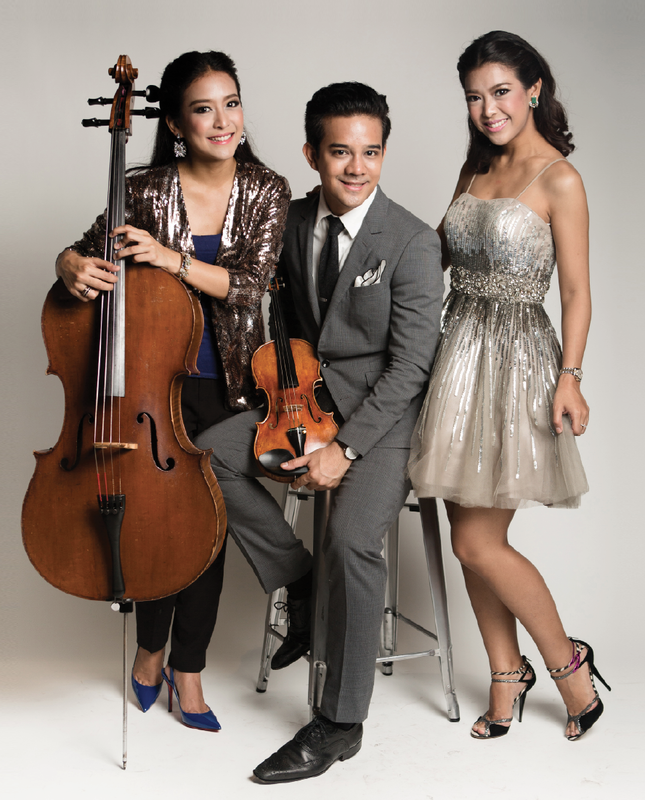
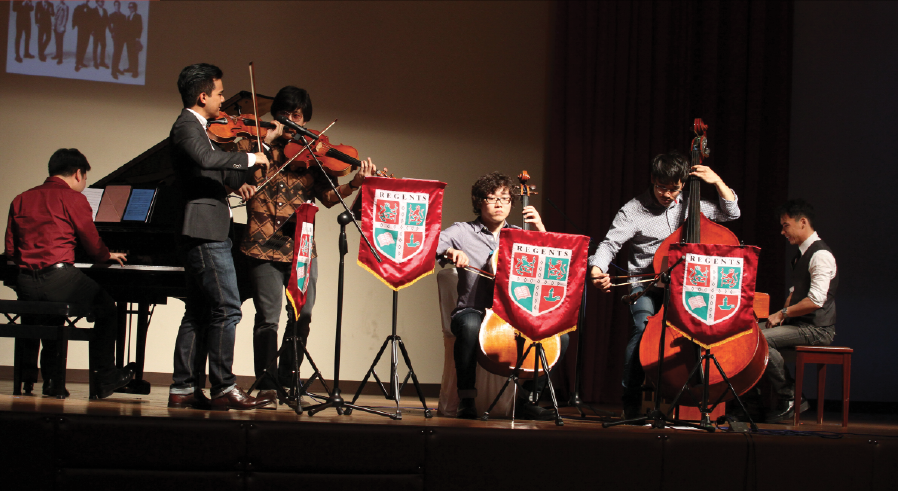
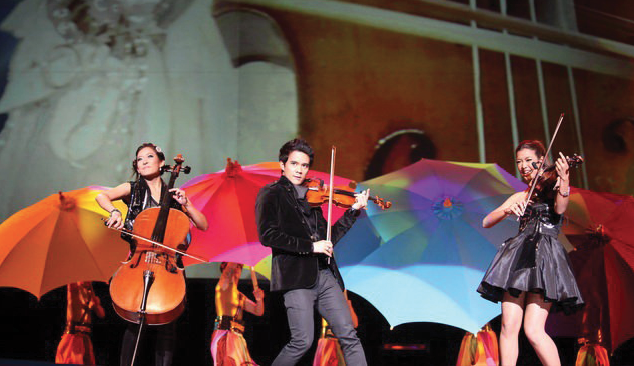
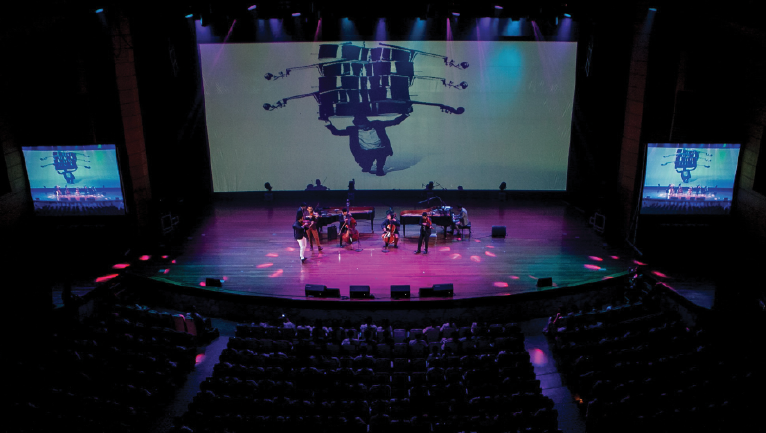
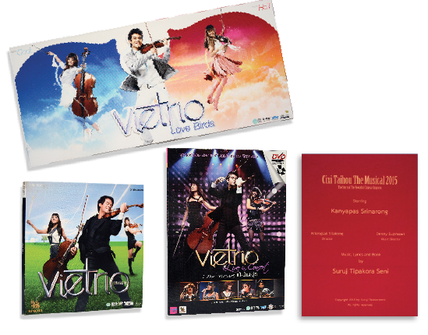
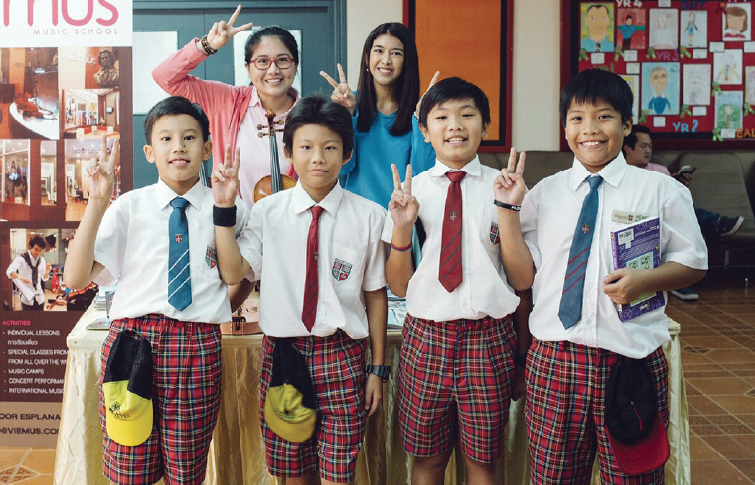
 RSS Feed
RSS Feed
















